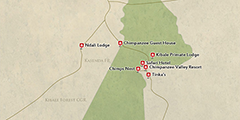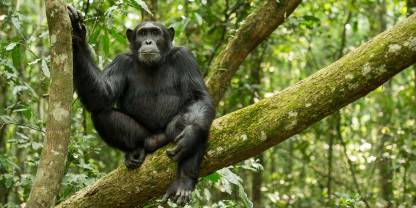Forested Kibale National Park is home to 13 primate species, the most for any protected area in Uganda. It is the country’s most popular destination. Visitors to Kibale should see several types of monkey, along with a variety of birds and butterflies. The surrounding countryside is dotted with beautiful crater lakes, many of which are overlooked by lodges from which the park can be visited.

-
Best Time To Go
- January to February and June to July (Chimp trekking is easiest)
-
High Season
- June to September (Peak time for Uganda)
-
Size
- 795km² / 307mi²
-
Altitude
-
928-1,568m /3,045-5,144ft
 View Photos
View Photos
 View Photos
+24
Photos
View Photos
+24
Photos
 Open Map
Open Map
Pros & Cons
- Very reliable
- Chimp habituation experience and night walks also available
- Large areas of pristine forest
- Excellent forest and wetland birding
- Nature walks and village visits offered in the neighboring Bigodi community
- Chimp trekking is far busier in Kibale than at other Ugandan sites offering this activity
Wildlife
Kibale is one of the best places in Africa to see a diversity of primates. Chimps are the biggest attraction, but large troops of olive baboon often pose along the main road and the fringing trees shake with red-tailed monkey, black-and-white colobus, Ugandan red colobus and Uganda mangabey. Less common are L’Hoest’s monkey and . Elephant, buffalo, leopard and lion inhabit or occasionally visit Kibale (which shares a border with Queen Elizabeth National Park), but sightings are unusual.
More about Kibale's wildlifeScenery
Kibale supports a range of habitats over different altitude zones. The tropical forest on the Fort Portal plateau changes to in the Albertine Valley floor in the south. The forest has suffered less from logging in the past compared to some other forests in the country. It is therefore still relatively pristine and home to some very big mahoganies, figs and other hardwood trees.
Activities
runs twice daily, at 8 AM and 2 PM. The habituated chimp community here is very relaxed and sightings are often excellent, but you might find that several trekking parties converge on one chimp group. For this reason, Kibale can feel crowded compared to other chimp trekking sites, especially in the morning (which is busier than the afternoon). Other guided activities include a full-day chimp habituation experience, forest walks, birding, night walks (to look for pottos and other nocturnal creatures) and visits to neighboring Bigodi Wetland Sanctuary.
Weather & Climate
Kibale’s closeness to the equator gives it a temperate climate year-round, with a daily average maximum of around 26°C/79°F. Temperatures are generally higher in the south of the park, where the altitude drops and the vegetation thins out. There’s no real Dry season to speak of, but rainfall is lowest in January, February, June and July. The wettest months are April, September, October and November, with other months falling between these extremes.
More about the weather and climateBest Time To Visit
The relatively drier months of January, February, June and July are best for . May and December are also good. You can still go looking for the primates in other months, but rain is more likely and conditions may be wetter underfoot. The success rate for seeing chimps is very high throughout the year. The East African sky is less hazy outside the drier periods.
More about the best time to visit



